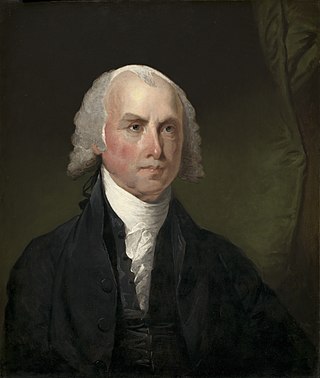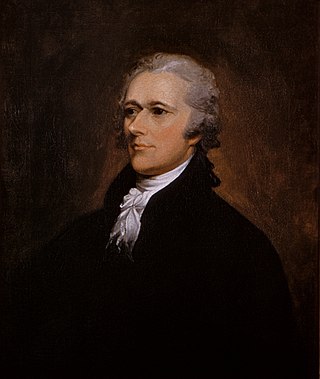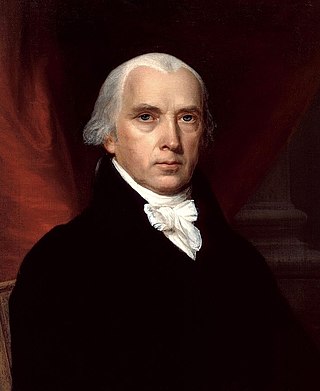
Article Five of the United States Constitution describes the process for altering the Constitution. Under Article Five, the process to alter the Constitution consists of proposing an amendment or amendments, and subsequent ratification.

The Federalist Papers is a collection of 85 articles and essays written by Alexander Hamilton, James Madison, and John Jay under the collective pseudonym "Publius" to promote the ratification of the Constitution of the United States. The collection was commonly known as The Federalist until the name The Federalist Papers emerged in the 20th century.

Anti-Federalism was a late-18th-century political movement that opposed the creation of a stronger U.S. federal government and which later opposed the ratification of the 1787 Constitution. The previous constitution, called the Articles of Confederation and Perpetual Union, gave state governments more authority. Led by Patrick Henry of Virginia, Anti-Federalists worried, among other things, that the position of president, then a novelty, might evolve into a monarchy. Though the Constitution was ratified and supplanted the Articles of Confederation, Anti-Federalist influence helped lead to the passage of the Bill of Rights.

Federalist No. 10 is an essay written by James Madison as the tenth of The Federalist Papers, a series of essays initiated by Alexander Hamilton arguing for the ratification of the United States Constitution. Published on November 22, 1787, under the name "Publius", Federalist No. 10 is among the most highly regarded of all American political writings.

Federalist No. 23 is an essay by Alexander Hamilton, the twenty-third of The Federalist Papers. It was published on December 18, 1787 under the pseudonym Publius, the name under which all The Federalist papers were published. One of the more significant essays in the series, No. 23 attempts to justify the increased strength of the federal government under the proposed United States Constitution, compared to the then-active Articles of Confederation. The paper is entitled "The Necessity of a Government as Energetic as the One Proposed to the Preservation of the Union".

Federalist No. 1 is an essay by Alexander Hamilton, which became the first of a collection of essays named The Federalist Papers. It was published on October 27, 1787, under the pseudonym Publius. This paper provides the outline for the rest and argues for the inadequacy of the Articles of Confederation.

Federalist No. 2 is an essay written by John Jay, the second of The Federalist Papers, a series of 85 essays arguing for the ratification of the United States Constitution. These essays, written by Jay, Alexander Hamilton, and James Madison, were published under the pseudonym "Publius". Federalist No. 2, titled "Concerning Dangers From Foreign Force and Influence" was published on October 31, 1787, as the first of five essays written by Jay where he addresses the advantages of a unified government over separate sovereignties. He discusses how an undivided country enforces laws with more efficiency, resolves conflicts, and gives better protection from foreign influences.

Federalist No. 6 is a political essay written by Alexander Hamilton, writing under the pseudonym of Publius, just like James Madison and John Jay in the other Federalist Papers. Published on November 14, 1787, this essay argues for the benefits of a union between the American states. Formally titled "Concerning Dangers from Dissensions Between the States", Federalist No. 6 continues to discuss that the States would devolve into conflict with each other. This discussion is a bastion of Federalist thought in their fight against the Anti-Federalists.

Federalist No. 11 is an essay by Alexander Hamilton, the eleventh of The Federalist Papers. It was published on November 23, 1787 under the pseudonym Publius, the name under which all The Federalist papers were published. It is titled "The Utility of the Union in Respect to Commercial Relations and a Navy".

Federalist No. 14 is an essay by James Madison titled "Objections to the Proposed Constitution From Extent of Territory Answered". This essay is the fourteenth of The Federalist Papers. It was published on November 30, 1787 under the pseudonym Publius, the name under which all The Federalist papers were published. It addresses a major objection of the Anti-Federalists to the proposed United States Constitution: that the sheer size of the United States would make it impossible to govern justly as a single country. Madison touched on this issue in Federalist No. 10 and returns to it in this essay.

Federalist No. 26, titled "The Idea of Restraining the Legislative Authority in Regard to the Common Defense Considered", is an essay written by Alexander Hamilton as the twenty-sixth of The Federalist Papers. It was published on December 22, 1787, under the pseudonym Publius, the name under which all The Federalist papers were published. Federalist No. 26 expands upon the arguments of a federal military Hamilton made in No. 24 and No. 25, and it is directly continued in No. 27 and No. 28.

Federalist No. 41, titled "General View of the Powers Conferred by the Constitution", is an essay written by James Madison as the forty-first of The Federalist Papers. These essays were published by Alexander Hamilton, with John Jay and James Madison serving as co-authors, under the pseudonym "Publius." No. 41 was published on January 19, 1788 and argues about the necessity of the powers the Constitution vested upon the general government as well as the meaning of the phrase "general welfare".

Federalist No. 49 is an essay by James Madison, the forty-ninth of The Federalist Papers. It was published on February 2, 1788, under the pseudonym "Publius", the name under which all The Federalist papers were published. It is titled "Method of Guarding Against the Encroachments of Any One Department of Government by Appealing to the People Through a Convention".

Federalist No. 52, an essay by James Madison or Alexander Hamilton, is the fifty-second essay out of eighty-five making up The Federalist Papers, a collection of essays written during the Constitution's ratification process, most of them written either by Hamilton or Madison. It was published in the New York Packet on February 8, 1788, with the pseudonym Publius, under which all The Federalist papers were published. This essay is the first of two examining the structure of the United States House of Representatives under the proposed United States Constitution. It is titled The House of Representatives".

Federalist Paper No. 54 is an essay by James Madison, the fifty-fourth of The Federalist Papers. It was published on February 12, 1788 under the pseudonym Publius, the name under which all The Federalist papers were published.

Federalist No. 66 is an essay by Alexander Hamilton, the sixty-sixth of The Federalist Papers. It was published on March 8, 1788 under the pseudonym Publius, the name under which all The Federalist papers were published. The title is "Objections to the Power of the Senate To Set as a Court for Impeachments Further Considered".

Federalist No. 76, written by Alexander Hamilton, was published on April 1, 1788. The Federalist Papers are a series of eighty-five essays written to urge the ratification of the United States Constitution. These letters were written by Alexander Hamilton, James Madison, and John Jay under the name of Publius in the late 1780s. This paper discusses the arrangement of the power of appointment and the system of checks and balances. The title is "The Appointing Power of the Executive", and is the tenth in a series of 11 essays discussing the powers and limitations of the Executive branch. There are three options for entrusting power: a single individual, a select congregation, or an individual with the unanimity of the assembly. Of all of the options, Hamilton supports bestowing the president with the nominating power and the ratifying power to the senate in order to have a strategy with the least bias.

Federalist No. 80 is an essay by Alexander Hamilton, the eightieth of The Federalist Papers. It was published on June 21, 1788 under the pseudonym Publius, the name under which all The Federalist papers were published. It is titled "The Powers of the Judiciary", and it is the third in a series of six essays discussing the powers and limitations of the judicial branch.
The Massachusetts Compromise was a solution reached in a controversy between Federalists and Anti-Federalists over the ratification of the United States Constitution. The compromise helped gather enough support for the Constitution to ensure its ratification and led to the adoption of the first ten amendments, the Bill of Rights.

James Madison was an American statesman, diplomat, and Founding Father who served as the 4th president of the United States from 1809 to 1817. He is hailed as the "Father of the Constitution" for his pivotal role in drafting and promoting the Constitution of the United States and the Bill of Rights. Disillusioned by the weak national government established by the Articles of Confederation, he helped organize the Constitutional Convention, which produced a new constitution. Madison's Virginia Plan served as the basis for the Constitutional Convention's deliberations, and he was one of the most influential individuals at the convention. He became one of the leaders in the movement to ratify the Constitution, and he joined with Alexander Hamilton and John Jay in writing The Federalist Papers, a series of pro-ratification essays that was one of the most influential works of political science in American history.









